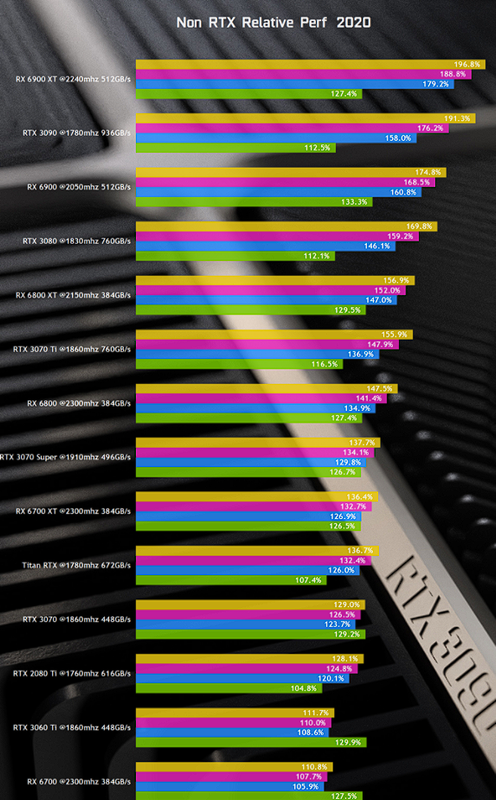Cause ampere has 80% better RT than Turing so not quite half then, if its as good as Turing it will have 60% of the RT performance of Ampere.
Dont get me wrong I am not knocking AMD but doubt they are going to be able to match Nvidia in RT this gen.
SO if each AMD is up to 10% faster than the equivalent Nvidia model its up against, once you switch on RT, the Nvidia card will be faster. Basic maths. Unless AMD can pull off 90% of the RT performance of AMpere and I havent see anybody trying to claim that anywhere.
I will be happy if AMD are faster than Nvidia at every card at raw power and slower with every card with RT on. Will all depend on price. No good if each model is matching Nvidia in price.
And I agree with DLSS, there are what 14 games that support it? So if you like it (I dont) and play games which support it then obviously the Nvidia card is going to massively outperform the AMD model until they get something out to compete against it.
Ampere isn't 80% better than Turing at RT?
From Hardware Unboxed:
Metro Exodus (DX12) 4K Ultra
RTX 3080: Native Resolution: 124fps Ray Tracing: 48fps
RTX 2080TI:Native Resolution: 92fps Ray Tracing: 37fps
RTX 2080: Native Resolution: 73fps Ray Tracing: 26fps
At Native 4K 3080 is 34.78% faster than the 2080 Ti, adding in Ray Tracing, 3080 is 29.72% faster.
At Native 4K 3080 is 69.86% faster than the 2080, adding in Ray Tracing, 3080 is 84.61% faster.
3080 Ray Tracing performance is 38.70% of Native 4k.
2080Ti Ray Tracing performance is 40.21% of Native 4k.
2080 Ray Tracing performance is 35.61% of Native 4k.
Shadow of the Tomb Raider (DX12) 4K Highest Quality
RTX 3080: Native Resolution: 87fps Ray Tracing: 51fps
RTX 2080TI:Native Resolution: 67fps Ray Tracing: 38fps
RTX 2080: Native Resolution: 52fps Ray Tracing: 29fps
At Native 4K 3080 is 29.85% faster than the 2080 Ti, adding in Ray Tracing, 3080 is 34.21% faster.
At Native 4K 3080 is 67.30% faster than the 2080, adding in Ray Tracing, 3080 is 75.86% faster.
3080 Ray Tracing performance is 58.62% of Native 4k.
2080Ti Ray Tracing performance is 56.71% of Native 4k.
2080 Ray Tracing performance is 55.76% of Native 4k.
Control (DX12) 4K High Quality
RTX 3080: Native Resolution: 56fps Ray Tracing: 36fps
RTX 2080TI:Native Resolution: 41fps Ray Tracing: 25fps
RTX 2080: Native Resolution: 32fps Ray Tracing: 16fps
At Native 4K 3080 is 36.58% faster than the 2080 Ti, adding in Ray Tracing, 3080 is 44% faster.
At Native 4K 3080 is 75.00% faster than the 2080, adding in Ray Tracing, 3080 is 125% faster.
3080 Ray Tracing performance is 64.28% of Native 4k.
2080Ti Ray Tracing performance is 60.97% of Native 4k.
2080 Ray Tracing performance is 50% of Native 4k.
Wolfenstien:Youngblood 4K Mein Leben! Quality, TSSAA
RTX 3080: Native Resolution: 142fps Ray Tracing: 84fps
RTX 2080TI:Native Resolution: 116fps Ray Tracing: 59fps
RTX 2080: Native Resolution: 89fps Ray Tracing: 44fps
At Native 4K 3080 is 22.41% faster than the 2080 Ti, adding in Ray Tracing, 3080 is 42.37% faster.
At Native 4K 3080 is 59.55% faster than the 2080, adding in Ray Tracing, 3080 is 90% faster.
3080 Ray Tracing performance is 59.15% of Native 4k.
2080Ti Ray Tracing performance is 50.86% of Native 4k.
2080 Ray Tracing performance is 49.43% of Native 4k.
So as you can see Ampere ranges from being similar to a bit better than Turing at Ray Tracing in actual games that use it, if it were truly 80% better than Turing at Ray Tracing then it would lose substantially less fps when turning it on comparing to how much fps Turing loses.




